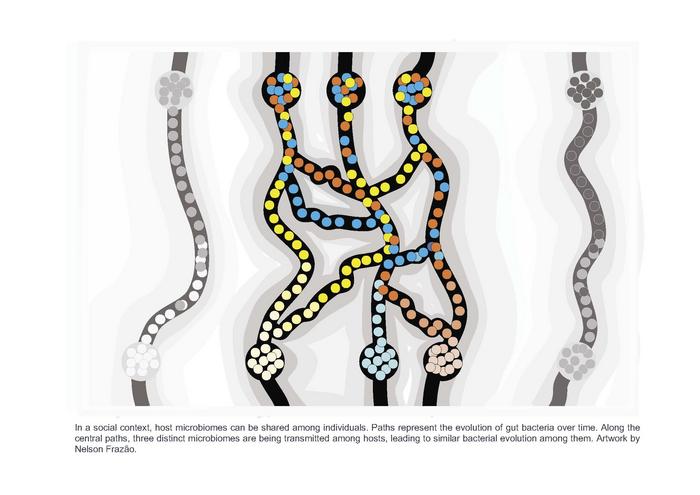Previous studies in humans and animals showed that hosts in a social condition (sharing the same space) harbor a more similar microbiota composition. Microbial transmission between hosts, which is increased when living in the same household, leads to similar species inhabiting the gut. However, whether bacterial evolution in the gut is affected by microbiota transmission remained unknown.

Credit: ©Nelson Frazão, IGC 2023
Previous studies in humans and animals showed that hosts in a social condition (sharing the same space) harbor a more similar microbiota composition. Microbial transmission between hosts, which is increased when living in the same household, leads to similar species inhabiting the gut. However, whether bacterial evolution in the gut is affected by microbiota transmission remained unknown.
To fill this knowledge gap, the researchers used an innovative in vivo experimental evolution approach, which revealed an average transmission rate of 7% of E. coli cells per day between hosts inhabiting the same household. This led to a high level of shared evolutionary events in cohoused mice, as a theoretical population genetics model predicted. Interestingly, the rate of mutation accumulation in E. coli was the same irrespective of the social context of the hosts.
This is the first study to show that hosts sharing the same diet and habits are expected to harbor similar microbiome species composition and, notably, similar bacterial evolutionary dynamics. These data uncover a significant role for bacterial transmission across hosts in shaping the adaptive evolution of new strains that colonize gut microbiomes.
Nelson Frazão, the study’s lead author, emphasizes the importance of these findings, stating, “Our research provides compelling evidence that social interactions and shared environments play a crucial role in the evolution of gut bacteria. Understanding these dynamics sheds new light on the interplay between human or animal health and social interactions.”
The discoveries by the research team led by Isabel Gordo, principal investigator at the Instituto Gulbenkian de Ciência, pave the way for new studies on the complex relationship between social interactions, intestinal bacteria, and human health.
The study was funded by Fundação para a Ciência e Tecnologia (FCT), project Global Gut Health Nature Research/Yakult, and ONEIDA project co-funded by FEEI – Fundos Europeus Estruturais e de Investimento from Programa Operacional Regional Lisboa 2020.
Journal
Molecular Biology and Evolution
DOI
10.1093/molbev/msad153
Article Title
Shared Evolutionary Path in Social Microbiomes
Article Publication Date
4-Jul-2023




